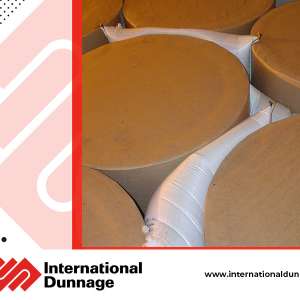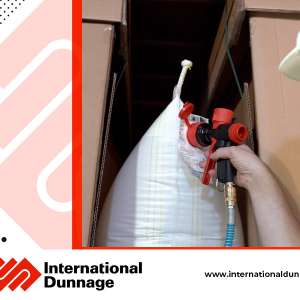In the vast and intricate world of logistics, a myriad of tools and devices are employed to ensure the safe and efficient transportation of goods. Among these, one might find the humble yet indispensable Level 2 Dunnage Bag. These seemingly simple contrivances, often overlooked amidst the cacophony of larger, more ostentatious machinery, play a crucial role in safeguarding cargo during transit.
The subject at hand is not merely a matter of practicality, but also one of economic and environmental concern. As we traverse this topic, we shall uncover how the use of Level 2 Dunnage Bags can significantly reduce the potential for damage, thereby curtailing unnecessary waste and financial loss. We shall also explore the underlying principles that govern their function, offering a comprehensive understanding of their design and application.
In the vast realm of logistics and freight transportation, there exists an unsung hero, often overlooked yet undeniably crucial in its role. This hero is none other than the Level 2 Dunnage Bag, a seemingly simple tool that plays a pivotal part in ensuring cargo safety during transit. These bags, filled with air and strategically placed between cargo items, act as cushions that absorb shocks and vibrations, thereby preventing damage to goods.
The significance of Level 2 Dunnage Bags extends beyond their primary function of protection. They are instrumental in maintaining the stability of stacked cargo, particularly in scenarios where irregularly shaped or unevenly distributed loads pose a risk of toppling. By filling void spaces and creating a uniform plane, these bags effectively counteract the forces that jeopardize cargo stability. Thus, the humble Level 2 Dunnage Bag, though unseen, stands as a silent sentinel guarding the integrity of goods in transit.
The Role of Dunnage Bags in Trucking
The open road, a realm rife with unpredictability, presents myriad challenges to the safe and efficient transportation of goods. The ceaseless jostling and jolting inherent in overland transport can wreak havoc on improperly secured cargo. Enter the dunnage bag, an unsung hero in the world of trucking, tirelessly working to safeguard freight from the rigors of the road.
Dunnage bags, when properly placed within the empty spaces of a truck’s cargo area, act as stabilizing agents that absorb shock and reduce damaging vibrations. These inflatable guardians conform to the shape of the cargo, filling voids and creating a secure, balanced load that is far less susceptible to shifting and potential damage during transport. Regardless of the bumps, twists, and turns encountered on the journey, the steadfast dunnage bag remains ever vigilant, ensuring the integrity and safety of the transported goods.
Ensuring Cargo Safety with Dunnage Bags
The vast and unpredictable nature of the sea presents a unique set of challenges when it comes to the safe transport of goods. The ceaseless ebb and flow of the ocean, coupled with the potential for turbulent weather conditions, can result in significant movement within the cargo hold of a ship. This is where dunnage bags step into the breach, serving as steadfast guardians against the relentless forces of the sea.
Dunnage bags, also known as airbags or inflatable bags, are designed to withstand substantial pressure and movement. When strategically placed within the cargo hold, they fill voids, secure loads, and absorb shocks from the constant motion of the sea voyage. These durable buffers adapt to the shape and size of the cargo, creating a stabilizing force that minimizes shifting, reduces damage, and ensures the safe arrival of goods at their destination. From the calmest seas to the roughest storms, dunnage bags play an essential role in maintaining the integrity and safety of seaborne cargo.
Minimizing Waste and Financial Loss
In the grand theatre of global commerce, the economic implications of cargo damage are far from trivial. Every damaged product represents not only a financial loss but also a missed opportunity, a disruption in the supply chain that can ripple outwards to affect a multitude of businesses and consumers. Herein lies the unsung economic value of dunnage bags. By preventing cargo damage, they help to minimize these losses, ensuring that goods reach their destination in sellable condition and transactions proceed as planned.
Beyond the realm of economics, dunnage bags also contribute significantly to environmental sustainability. Traditional methods of securing cargo often involve materials such as wood, which has led to deforestation and habitat destruction. Dunnage bags, on the other hand, are reusable and often made from recyclable materials, reducing waste and the demand for raw resources. Moreover, by preventing cargo damage, they reduce the amount of waste going to landfill, further lessening their environmental impact. Thus, the humble dunnage bag plays a dual role, safeguarding both our economic interests and the health of our planet.
The Science Behind Dunnage Bags
Dunnage bags, often referred to as airbags, are marvels of simple design and function. They are typically made from two primary components: an inner layer that holds the air, and an outer layer that provides strength and durability. The inner layer is usually crafted from a polymer material capable of holding air under pressure, while the outer layer is often composed of woven polypropylene or polyester, materials known for their robustness and resistance to tearing.
The science behind dunnage bags lies in their ability to maintain stability and secure cargo during transportation. When properly inflated and positioned, these bags exert a force against the cargo, filling void spaces and creating a firm cushion that prevents movement. This force is evenly distributed across the surface of the bag, effectively bracing the cargo and minimizing any potential shifting or damage. Despite their simplicity, dunnage bags are a testament to the power of well-applied physics and engineering, providing an efficient and effective solution to the age-old problem of cargo transportation and safety.
You can contact International Dunnage for more information about Level 2 Dunnage Bags.








